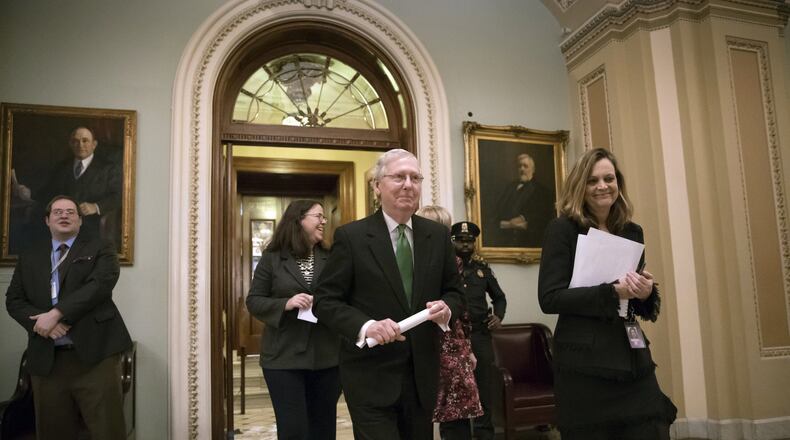The deal, which provides an additional $85 billion for defense in the second year, is a major relief for Wright-Patterson Air Force Base. If Congress approves the agreement, not only would defense spending be increased, but thousands of workers at the base would not face the threat of being furloughed by a partial shutdown of the federal government.
Rep. Mike Turner, R-Dayton, said called the budget deal “a huge win for our men and women in uniform, including those at Wright-Patterson Air Force Base. We are finally delivering them what we’ve promised: stable funding they can rely on to address this readiness crisis and rebuild our military.”
The bill also includes an additional $6 billion during the next two years to deal with the opioid crisis and $20 billion for roads, bridges, waste-water treatment and rural broadband.
Budget hawks may balk at the deal. The two-year agreement would increase federal spending by as much as $400 billion at a time when budget deficits are already expected to dramatically increase, in part because of a $1.5 trillion tax cut approved late last year by congressional Republicans and signed into law by President Donald Trump.
“This budget compromise is a terrible deal,” Rep. Jim Jordan, R-Urbana, said in a statement. “Hiking spending 13 percent and ballooning the deficit is irresponsible and not what we were elected to do.”
Senate approval seems almost certain, however, and lawmakers on both sides of the aisle Wednesday were touting various aspects of the spending plan. Sen. Sherrod Brown, D-Ohio, said the $6 billion over two years to battle opioids “is a good start for Ohio communities in desperate need of resources.
Sen. Rob Portman, R-Ohio, said he was “pleased to see” both parties come together on a plan that increases military funding and makes “key investments to address this opioid crisis while keeping our government running.”
Speaking on the Senate floor, Schumer called the budget deal “a genuine breakthrough. After months of fiscal brinkmanship, this budget deal is the first real sprout of bipartisanship. And it should break the long cycle of spending crises that have snarled this Congress and hampered our middle class,” he said.
The agreement breaks the restrictions on federal domestic and defense spending established by a 2013 law. That law limited defense spending this year to $549 billion and domestic spending to $516 billion. The law did not restrict federal spending for Social Security, Medicare, and Medicaid.
Many Democrats and Republicans have objected to the spending restrictions, with GOP lawmakers calling for more defense dollars and Democrats insisting on more spending for domestic programs. Both sides seemed to get some of what they wanted in the deal announced by McConnell and Schumer.
In addition to the $165 billion boost in military spending over two years, domestic spending would increase by $63 billion in the 2018 federal spending year and $68 billion in the 2019 spending year.
In a floor speech, McConnell said in “the face of continuing and emerging threats,” spending for national defense under the old caps “have left us unable to realize the potential of our missile defense capabilities. They whittled down our conventional forces … and shrunk our fleet to its lowest ship count in nearly three decades.”
A government shutdown looms if both houses don’t vote by midnight tonight or pass another temporary extension.
One of those most unhappy with the deal was House Minority Leader Nancy Pelosi, D-Calif. For hours Wednesday, Pelosi stood on the House floor and blasted the fact that the agreement does not include legal protection for Dreamers, the undocumented immigrants brought to the United States when they were children.
Pelosi and other House Democrats are pushing for a commitment for a vote to extend the Deferred Action for Childhood Arrivals policy, which is set to expire next month. Without an extension, the roughly 700,000 people with DACA status nationwide could lose protection under the law and face possible deportation.
During her speech, Pelosi read testimonials from Dreamers in various situations throughout the country.
About the Author
